Corsica(fr. Corse, cors. Corsica, Italian. Corsica is the fourth largest island in the Mediterranean. It is one of 18 regions; however, Corsica has a special status - Territorial community of Corsica(fr. Collectivite Territoriale de Corse ). Includes the departments of South Corsica and Upper Corsica. Main city - . Population - 314,486 (2011) people (25th among all regions and 22nd among the European part), mostly Corsicans.
Geography

Corsica from the satellite
The island arose about 250 million years ago as a result of the uplift of a granite ridge in the western part of the island. About 50 million years ago, sedimentary rocks crawled over the base of this range and formed the shale uplands on the eastern side. After, and Cyprus, this is the fourth largest island in the Mediterranean and the most mountainous, it is called " mountain in the sea».
Elongated from south to north, the island has a maximum length of 183 km and a width of 83 km. The length of the coastline is about 1,000 km. The area of the territory is 8,680 km². The highest peak is Monte Cinto (2706 m). 3/4 of the total area are mountains, 20 of them have a height of at least 2,000 m, they are located mainly closer to the middle of the island. About 20% of the mountains and valleys are covered with forests.
Slightly more than 40% of the territory (3,500 km²) is occupied by the Regional Nature Protection Park of Corsica (Parc naturel régional de Corse), designed to preserve the unique ecosystem that has developed in the central part of the island. However, only economic activity is limited - tourists are not prohibited from visiting the park, there is even the so-called "Great Excursion Trail No. 20" (GR20), which is part of the pan-European network of long walking routes and is well known to those who are fond of landscape walks.
There are many springs, streams and rivers in the mountains. The most significant are Gravona, Restonica, Taravo, Tavignano, Rizzanese, but none of them is navigable. The largest river is the Golo (90 km).
The island is only 90 km away from the Italian coast, and 170 km from the French coast. From Sardinia, located to the south across the Strait of Bonifacio, Corsica is separated by only 11 km at its narrowest point.
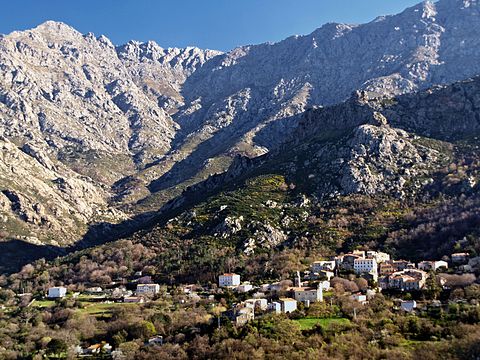
History
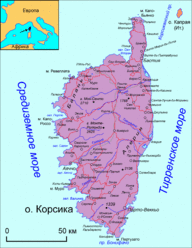
Modern map of the island
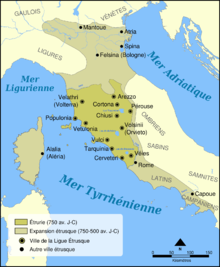
Corsica under the rule of the Etruscans. (VIII century BC - V century BC).
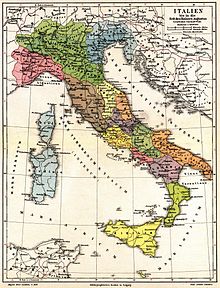
Italy in the 1st century BC e.
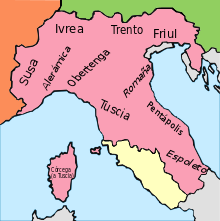
Kingdom of Italy. (781-1024).
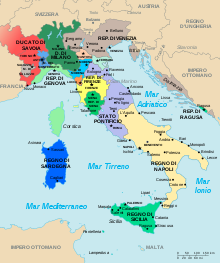
Italy 1494.
In the VI millennium BC. e. local hunter-gatherers began to be crowded out by the Impresso culture, whose descendants entrenched themselves on the island for several millennia. The cultural traditions of Corsica were significantly influenced by the neighboring one. In the middle of the II millennium BC. e. Under the influence of the Sardinian Bonnanaro culture, the Torre culture arises on the island, the monuments of which are the Torre towers, reminiscent of the Sardinian nuraghe. Soon after, Corsica was occupied by the Nuraghi builders, and later by the Etruscans related to them.
In the VI century BC. e. The Phocian Greeks landed on Kirn (Corsica), where they founded the city of Alalia, for which a whole naval battle broke out with the Etruscan-Carthaginian fleet. They took possession of Corsica in the 5th century BC. e. The Carthaginians were forced to cede the island in 238 BC. e. the Romans. Although the Corsicans rebelled against the oppression of the Roman governors, but after a seven-year (236-230) bloody struggle, their uprising was completely suppressed. Corsica flourished under the rule of the emperors and consisted of 33 walled cities.
Corsica fell into a great decline in the 5th century from repeated invasions of the Vandals, whose dominion (from 470) depleted the country. Belisarius liberated it (533) from the vandals, and since then the island alternately belonged to Byzantium, then to the Goths, until the Franks (754) and Saracens (850) took possession of it, as evidenced by the towers on the seashore. At the beginning of the 11th century, Corsica was taken over and divided into many small fiefs.
In 1002, the Corsicans rebelled against the oppression of the barons and established in the northeast something like a representation, from 15 hereditary caporals; in the southwest, the counts of Chinarka, Istria, della Rocca, etc., became the heads of the population.
Since 1077, the Corsicans have recognized the Pope as their supreme head; Urban II handed over control of Corsica to the Pisans, who lost it after a long and bloody struggle to the Republic of Genoa (1300). The Corsicans did not immediately recognize the power of Genoa, only in 1387, and tried to overthrow it several times (for example, the uprising of 1553-1570 led by Sampietro).
For three hundred years, from the 14th to the 17th century, the Genoese, Aragonese and national parties fought with varying success in Corsica. At this time, the island was famous for its pirate bays and large slave markets. In 1729 the Corsicans once again took up arms against the Genoese rulers. With the help of the imperial troops, Genoa crushed the uprising (1730). In 1735, Baron von Neuhof gained such popularity among the population that he was proclaimed king, but he ruled for only eight months, forced to leave the island even before the arrival of the French, who were called to help Genoa (1738).
In 1741 rebellion broke out again. The rebellions of 1752 and subsequent years were led by two Paoli - Giacinto and his son, Pascal. General Pascal Paoli became the head of the first independent government in the history of Corsica, by 1764 limiting the power of the Genoese to only four coastal cities headed by. Inspired by the advanced ideas of French philosophers, Paoli introduced a constitution on the island that gave all men over 25 years of age the right to elect their representatives to the Administrative Council. This was the first experience of universal suffrage in the modern history of Europe. In 1768, according to the Treaty of Compiègne, not finding the opportunity to suppress the national movement of the Corsicans on her own, she transferred the island to France "for debts." The invading French troops quickly defeated Paoli's supporters, forcing him to leave Corsica and take refuge in England. The short-lived independence of Corsica was over. In the same year, in the capital of Corsica, in the family of ardent supporters of Pascal Paoli, Buonaparte, Napoleon was born "the greatest Corsican", "the first unifier of Europe".
In 1943-1945, the Western allies in the anti-Hitler coalition called the island "USS Corsica" ( USS Corsica), since on the island, after the liberation from the Germans, 22 tactical aviation airfields were deployed, from which raids were made on the territory of Italy occupied by the Nazis.
Corsican separatism
National Liberation Front of Corsica(fr. Front de liberation nationale de la Corse , cors. Fronte di Liberazione Naziunale Corsu) - a separatist organization based in the south, which aims to achieve complete political independence or expand the rights of the autonomy of Corsica, as well as the recognition by the country's authorities of the "people of Corsica" (according to French laws, all citizens of the country are considered French).
Famous personalities
Napoleon Bonaparte was born in Corsica (in Ajaccio), as well as the family of military and statesmen Abbatucci. Also, according to one version, Christopher Columbus was born in Corsica.
city (fr. Ajaccio) is the birthplace of the singer Alizée (full name is Alize Jakote).
The father of the French model and actress Laetitia Casta is from Corsica. This is where she spent her childhood. In August 1993, when she was 15, she played with her younger sister Marie-Ange on the beach in San Ambrogio. Photographer Frederic Creceaux, who was on vacation, noticed her and suggested to a friend from the Madison Models Agency (Paris) that he talk to her father about test shots.
French singer and star of the musical "Notre Dame de Paris" Patrick Fiori grew up in Corsica, and his mother is of Corsican origin. In 1993, representing at the Eurovision Song Contest, Fiori took 4th place with the song "Mama Corsica", dedicated to his homeland.
see also
- National Liberation Front of Corsica
- Lake Rotondo
